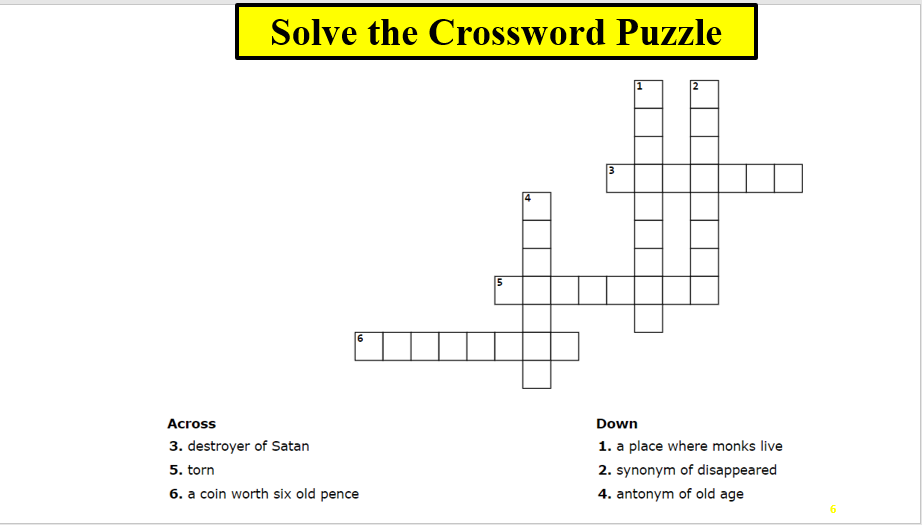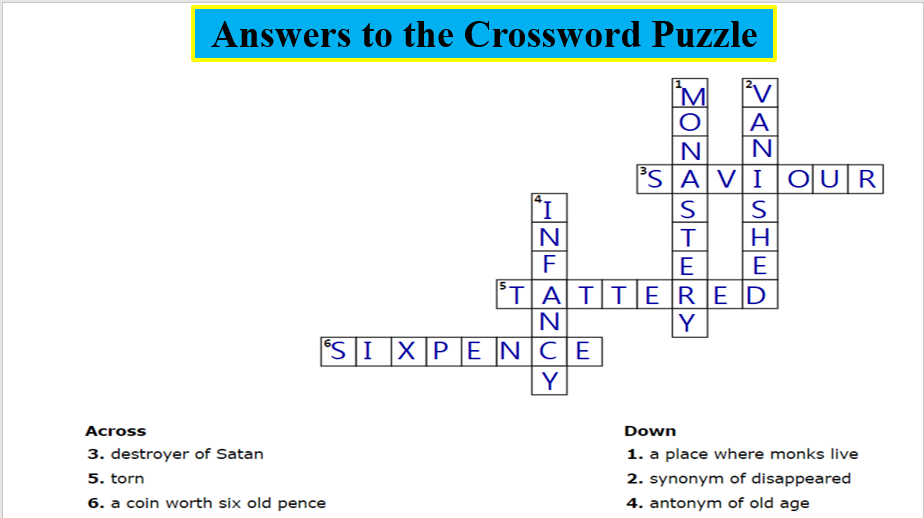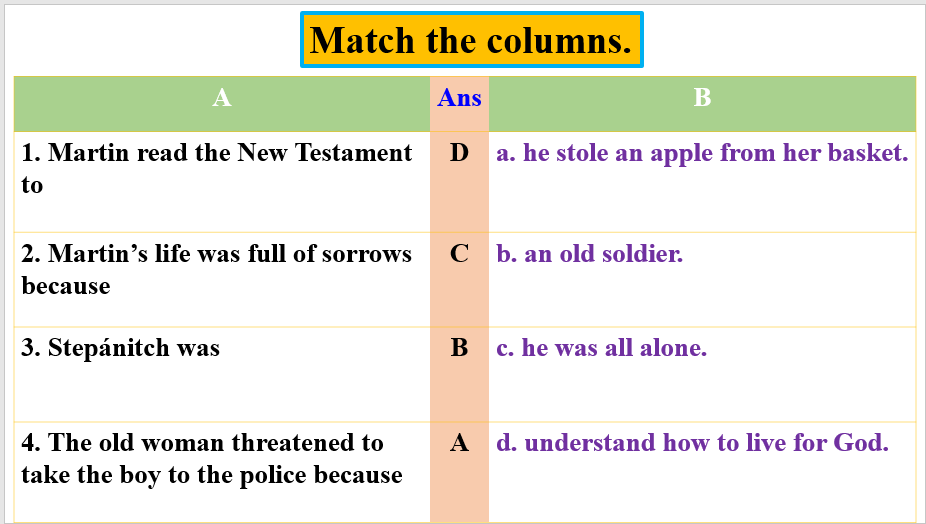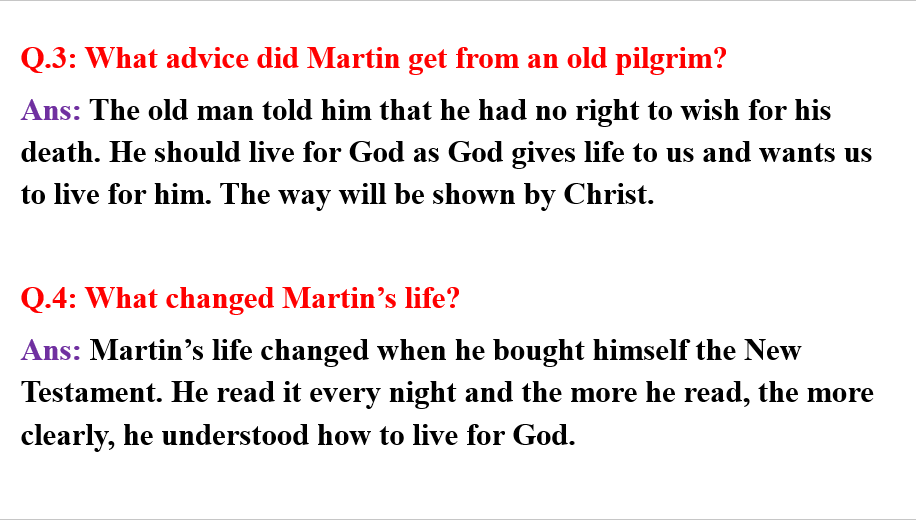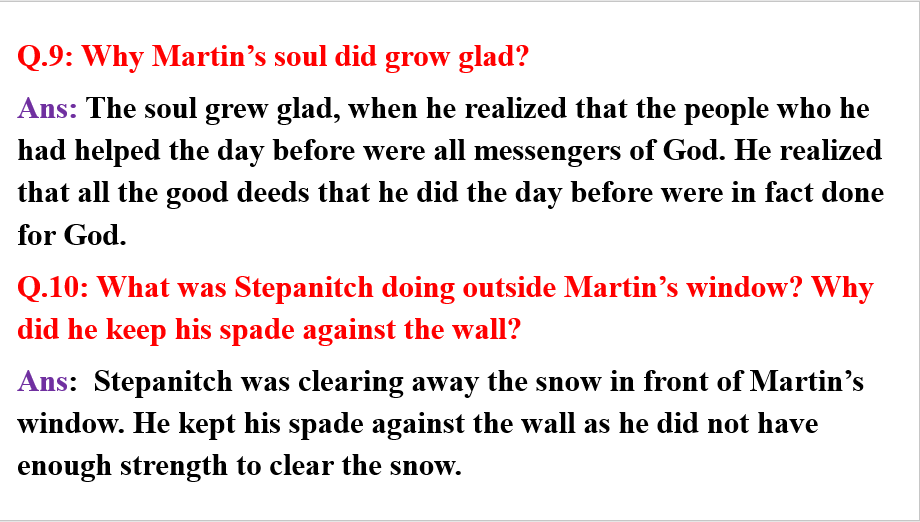
An abridged version of ‘Where Love Is, God Is’ by Leo Tolstoy Martin Avdéiteh, a cobbler, lived in a tiny room in a basement. The room had only one window. Through the window, he could only see the feet of those who passed by. He had lost all but one of his children in their infancy. When his wife died too, Martin was left with a three year old son. When the boy reached an age when he could help his father, he too fell ill and died a week later. Full of sorrow, Martin prayed that he might die too. He stopped going to church.
Now in his old age, Martin wanted to draw nearer to God. One day a man from the monastery visited him and Martin began to complain about his sorrows. “All I ask of God is that I may soon die,” Martin said.
The man replied, “You have no right to say such things, Martin. We cannot judge God’s ways. You are in despair because you wish to live for your own happiness.
“What else should one live for?” asked Martin.
“Live for God. When you learn to live for Him, you will not grieve,” said the old man.
“But how is one to live for God?” asked Martin.
The man answered, “Christ has shown us how to live for God. That day Martin bought himself the New Testament. He read it every night and the more he read, the more clearly he understood how to live for God.
Once Martin came upon the verses from the Gospel of Luke:
To him that smiteth thee on the one cheek, offer also the other; and from him that taketh away thy c/oak, withhold not thy coat also. Give to every man that asketh thee; and of him that taketh away thygoods, ask them not again. And as ye would that men should do to you, doye also to them likewise.
Martin felt happy when he read these words. He kept reading till he fell asleep.
“Martin!” he suddenly heard a voice.
“Who’s there?” he asked.
Then he heard quite distinctly, “Martin, Martin! Look out into the street tomorrow, for I shall come.
The next morning, he rose before daylight and after saying his prayers, he prepared his meals. Then he sat down to work by the window. However, he looked out into the street more than he worked.
Then an old soldier named Stepånitch came to clear away the snow. Stepånitch leaned his spade against the wall. He did not have the strength to work, Martin called Stepånitch and gave him some tea to drink.
“Thank you, Martin, for giving me food and comfort for both soul and body,” Stepånitch said.
After Stepånitch went away, Martin continued to look out of the window.
Then a woman wearing worn out summer clothes with a baby in her arms stopped by the wall with her back to the wind, trying to wrap the baby.
Martin called her inside.
“Warm yourself near the stove and feed the baby,” said Martin.
“I haven’t any milk. I haven’t eaten myself since morning,” said the woman.
He gave her some cabbage soup and bread, and took care of the baby while she ate.
“Haven’t you any warmer clothing?” he asked.
“I pawned my last shawl for sixpence yesterday, “she replied.
After the woman finished eating, Martin gave her an old cloak and sixpence to get her shawl out of pawn.
“The Lord bless you. Surely it must have been Christ who made you look out of your window and take pity on me.”
After the woman had left, Martin ate and worked, but did not forget the window.
After a while, Martin saw an apple-woman put down a large basket with few apples and a sack full o chips on the footpath. Just then, a boy in a tattered cap snatched an apple out of
the basket and tried to slip away; but the old woman caught the boy and threatened to take him to the police. Martin rushed out of the door and said, “Forgive him for Christ’s sake i,
The old woman let go.
“Ask for Granny’s forgiveness!” said Martin. ‘And don’t do it another time.”
The boy began to cry and to beg pardon.
“He ought to be whipped so that he should remember it for a week,” said the old Woman. “Oh, Granny,” said Martin, “that’s not God’s way. If he should be whipped for stealing, what should be done to us for our sins? God wants us to forgive or else He won’t forgive us.”
As the old woman was about to hoist her sack on her back, the boy offered to carry it. Thus, they went down the street together. Then Martin went back to the house and opened the Gospel, when the dream came back to him.
A voice whispered, “Martin, Martin, don’t you recognise me?”
And out of the dark corner, one by one, came all the visitors Martin had met throughout the day. They all smiled and vanished like a cloud.
And Martin’s soul grew glad. He began reading the Gospel just where it had opened; the top of the page read,
I was hungry, and ye gave me to eat: I was thirsty, and ye gave me drink: I was a stranger’ and ye took me in.
And the bottom of the page read In as much asye did it unto one of these my brethren even these least, ye did it unto me.
And Martin understood that the dream had come true; and that the Saviour had welcomed him.




